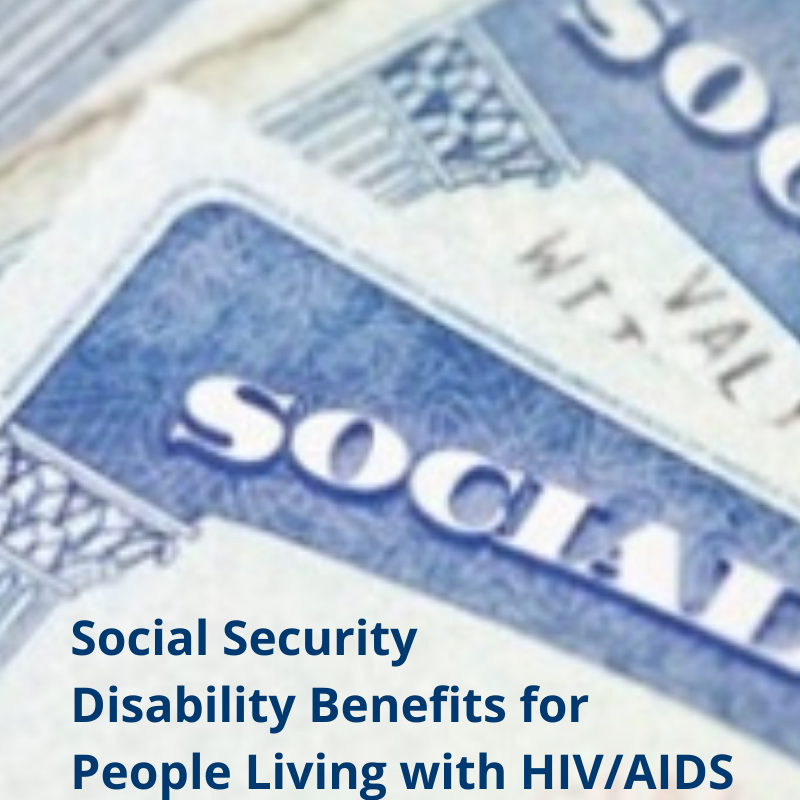How to Qualify for Social Security Disability Benefits With HIV/AIDS
If you have HIV or AIDS, and your symptoms have advanced and made it impossible for you to work and earn a living, you may qualify for
Social Security Disability benefits. The Social Security Administration
(SSA) oversees two different disability programs that offer monthly benefits to disabled workers. A medical guide, which is called the Blue Book, is used to determine if an individual meets the medical criteria to qualify for disability benefits. There are several listings in the Blue Book that may apply to an HIV or AIDS diagnosis, but there is a specific listing that focuses on the condition itself.
Meeting the Medical Criteria
Section 14.00 of the Blue Book applies to adult immune system disorders.
Listing 14.11 itself applies to HIV infection itself. To qualify using this listing, you must provide documentation to confirm your diagnosis, and you must also be able to prove one of the following:
- Multicentric Castleman disease that affects multiple groups of organs containing lymphoid tissue or lymph nodes OR
- Primary effusion lymphoma OR
- Progressive multifocal leukoencephalolopathy OR
- Primary central nervous system lymphoma OR
- Pulmonary Kaposi sarcoma OR
- Absolute CD4 count of 50 cells/mm3 or less OR
- Absolute CD4 count of less than 200 cells/mm3 or CD4 percentage of less than 14 percent, and one of the following – BMI measurement of less than 18.5, hemoglobin measurement of less than 8.0 grams per deciliter, or complications of HIV infection requiring a minimum of three hospitalizations within a 12-month period at least 30 days apart with each hospitalization lasting no less than 48 hours.
For your claim to be successful, you must provide hard
medical evidence that includes test results and different laboratory tests that confirm your diagnosis and that support your claim. Any opportunistic diseases that you have been diagnosed with should have indications of a cell-mediated immunity and should have been diagnosed by the proper testing. As an example, provide biopsy results for any cancer diagnosis and biopsy results for toxoplasmosis of the brain. You should provide detailed records that confirm any systems, restrictions, and limitations, such as headaches, fever, brain lesions, and seizures.
Even if your diagnosis does not meet any of the specific Listings set out above, you can still be found disabled if you can show that your impairment prevents you from being able to perform the functions of your past relevant work or other full time work.
Medical tests, including positive serology tests, should be provided to help confirm the diagnosis and its severity. Some blood tests, including CD4 tests, aren’t adequate for confirming a diagnosis of HIV or AIDS. Remember, hard medical evidence and supporting documentation are essential for a disability claim to be successful.
Applying for Disability Benefits
If you are unable to work because of HIV or AIDS, or because of an opportunistic disease resulting from either of those conditions, you should apply for Social Security Disability benefits. You can start your application process online at the
SSA’s website or by calling 1-800-772-1213 and talking with a representative or by scheduling an appointment at
your local SSA field office. While it sometimes takes months for a claim to be approved, the more documentation that you provide to support your claim, the more likely you are to get an approval and be awarded disability benefits.
Resources:
https://www.disability-benefits-help.org/social-security-disability-locations/
https://www.ssa.gov/disability/
https://www.ssa.gov/disability/professionals/bluebook/14.00-Immune-Adult.htm
https://www.ssa.gov/disability/professionals/bluebook/14.00-Immune-Adult.htm#14_11
https://www.disability-benefits-help.org/glossary/social-security-disability-medical-sources
https://www.ssa.gov/applyfordisability/




